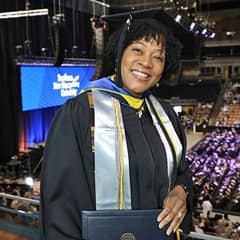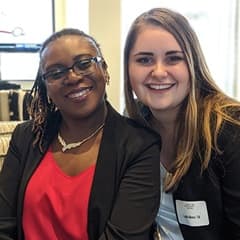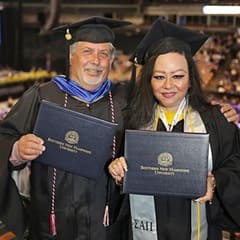Top 7 Reasons Why College is Important

Understanding the numbers
When reviewing job growth and salary information, it’s important to remember that actual numbers can vary due to many different factors—like years of experience in the role, industry of employment, geographic location, worker skill and economic conditions. Cited projections are based on Bureau of Labor Statistics data, not on SNHU graduate outcomes, and do not guarantee actual salary or job growth.
With more and more careers requiring advanced education, a college degree can be critical to your success in today's workforce. Research indicates that earning a degree can have a significant and expansive impact on your life. It also has the potential to help you positively impact your family — and the world.
Here are 7 reasons why college could be important for you.
 Boost Earning Potential*
Boost Earning Potential*
The U.S. Bureau of Labor Statistics (BLS) notes that workers with a postsecondary degree typically earn more than those with only a high school education.*
The median weekly earnings — or the middle amount in a set of data — for people with an associate degree was $1,058 per week in 2023, according to BLS.* That's an increase of $159 per week or over $8,000 more per year than those with only a high school diploma.*
Workers with a bachelor's degree earned a median of $1,493 weekly in 2023, BLS reports — $594 more per week than workers without a postsecondary education and an increase of more than $30,000 per year.*
A master's degree helped workers earn even more at a median of $1,737 per week in 2023, BLS notes. That's $838 more weekly than those with only a high school diploma and almost $43,000 more per year.*

 Increase Chances of Employment*
Increase Chances of Employment*
It's not uncommon to see "bachelor's degree required" on job descriptions or listed as a preferred qualification. A 2023 Recruiting Benchmarks Survey by the National Association of Colleges and Employers (NACE) found that, on average, nearly 70% of entry-level jobs list a bachelor's degree requirement.
Both associate and bachelor's degree programs offer a combination of general education courses and specialized learning in a discipline that interests you. With these degrees, you can develop both broad-based and field-specific knowledge.
You may also have a chance to grow important technical and soft skills by participating in experiential learning opportunities, which are hands-on experiences you can translate to the professional world.
Experiential learning takes many forms and may exist both in and out of the classroom. For example, if you're earning a cybersecurity degree, you might join your college's National Cyber League (NCL) team to test your working knowledge of cryptography and other concepts you might encounter while working in a cybersecurity role.
Additional types of experiential learning you might take advantage of in college include project-based assignments that partner with real organizations, internships and student clubs and organizations. You can leverage these valuable experiences on your resume, in your portfolio of work and during job interviews to show employers that you are a competitive candidate.
Earning a college degree could also lead to greater career stability. According to BLS data, 2.2% of workers with a bachelor’s degree faced unemployment in 2023 compared to 3.9% of workers with only a high school diploma.
 Expand Your Opportunities
Expand Your Opportunities
A college degree can be the extra credential you need to land the dream job you've always wanted. Getting your bachelor's degree may also allow you to view your work as a career and not just a job.
A 2016 Pew Research Center report stated that 77% of workers with a post-graduate degree and 60% of workers with a bachelor's degree believe their jobs give them a sense of identity, versus just 39% of those with only a high school diploma or less.

This idea still holds today. The Lumina Foundation and Gallup noted in The State of Higher Education 2024 study that 50% of surveyed undergraduate students cited the pursuit of a more fulfilling career as an important reason why they're earning a degree (Lumina PDF Source).
An example of this is Southern New Hampshire University (SNHU) graduate Victoria Meuse '22, who advanced to a teaching position with the help of her bachelor's degree. (Note: Teaching requirements vary by state, district and school.)
Meuse is a military spouse, and during the pandemic and her husband's deployment, she homeschooled her oldest daughter. This experience inspired her to continue teaching, and with a degree, Meuse started a new role at her children's elementary school.
"I love working at my kids' school," she said. "I think that the background in psychology has helped me a lot in understanding the students."
 Prepare for the Future
Prepare for the Future
You can also gain practical life skills as a college student. For example, you will need to meet regular assignment deadlines for each class. The discipline and time management strategies you learn along the way can be applied to all aspects of your life, whether you're navigating projects at work or your family's busy schedule.

A college degree can also impact your family members and their futures. For Tarah Theis '22, earning a bachelor's in communication meant setting an example for her sons.
She said they all want to go to college after seeing their mom do it. "That's the biggest success to me ... starting a legacy and showing them a good path to follow," Theis said.
Since your earning potential is typically greater as a college graduate, your degree may lead toward financial stability for you and your family. Your school's finance counselors can walk you through more than just how to pay for college. With their tips and advice, you may discover helpful budgeting techniques and learn more about financing options and processes that may be relevant to future investments — such as purchasing a car or a home.

Homeowners are increasingly more likely to be college-educated. Point2, an organization that reports on real estate market trends, analyzed U.S. Census data to find that 70% of homeowners in 2020 had some college education and at least 40% had a bachelor's degree.
Marilynn Hymon-Williams '22 saw her education as a stepping stone to a better future — and a better retirement.
After completing her bachelor's in healthcare administration, she was already thinking about a master's degree. "I'm invested in (the) future because a lot of people think that when you get older, it's over," Hymon-Williams said. "It ain't over. Uh-uh, nope. It's just started."
 Build New Relationships
Build New Relationships
College can be more than just an education; it can be a place you build all types of new relationships. Initially, you may establish a connection with an academic advisor — someone who will be there to support you throughout your college experience, encourage and mentor you for personal success and more.
Faculty — your course instructors — can also provide help with understanding your assignments and what's expected of you as a student.
Once classes begin, you'll be surrounded by peers. Engaging with your peers through activities like group work or class discussions can be a great way to start a professional network and make lasting connections.

When SNHU student Lydia Alonci '18 was offered a full-time position while attending the Grace Hopper Conference, she told her prospective employer that she would only accept the job if they gave her friend from SNHU, Patricia Odani Mukuka '18, '21G, a chance too.
This led to the organization offering Odani Makuka an internship. That experience later turned into a full-time job.
The relationships you build in college can go on to become the foundation of your professional network. And after you graduate, you'll join an alumni community.
An alumni community is full of graduates who can give back in a variety of ways, including through community service, participating in and organizing events and mentoring current students, among other ways. Alumni work in a wide range of fields, and establishing a relationship with others in this network could lead to professional opportunities.
Find Your Program
 Achieve Your Personal Goals
Achieve Your Personal Goals

While your degree can have many perks for your professional goals, finishing college can be an important personal goal, as it was for John Reck '22.
Reck is a 1% survivor of a rare infection called septicemia. He's also suffered a heart attack, been in a coma, undergone 18 surgeries and lost the ability to walk and talk.
"Life goes on around you," he said of his time in the hospital during his health scare. "It's lonely." Once Reck was on the road to recovery, he knew his next goal. After 30 years, he would go back to school — and this time it was for him.
"School came upon me like a bell," Reck said. "I'm going to go finish my degree, and here I am, alive." He now holds his bachelor's in graphic design. In achieving his personal goal, he has also attained a professional one. He secured his dream job as a graphic designer for a Boston law firm.

In a recent survey, 500 people were asked what the greatest benefit was in achieving their degree, and 57% said it was accomplishing a personal goal for themselves.** For first-generation college students, achieving a degree is a major personal goal for themselves and their families.
SNHU graduates Marlene Riley '22 and Michael Riley '18 '22MBA, wife and husband, walked across the stage together. Marlene is an immigrant from Peru, and Michael is a veteran, and both are first-generation college students.
Finishing their degrees was a personal goal they were able to achieve together, and it was even more special sharing the moment at Commencement.
"He is my team, and we did it together," said Marlene.
 Make a Difference
Make a Difference
Earning your college degree can improve the lives of those around you, too. The College Board's 2023 report on the benefits of higher education for individuals and society reported that college graduates are more likely to volunteer and vote (College Board PDF Source).
Some colleges encourage students to give back by organizing volunteer opportunities. SNHU holds an annual community service initiative, Global Days of Service. Approximately 1,500 members of the SNHU community served 239 organizations in 2024.

A former Global Days of Service site leader, Cassi Key '22, who earned an online English degree from SNHU, was so inspired by her involvement with Global Days of Service that she started an organization focused on planting seeds and promoting environmental education.
Like Key, you might be galvanized to make a difference in the world after graduating from college. Many students learn about topics like social change or environmental sustainability throughout their degrees and go on to make an impact in a number of ways.
A TIME magazine article noted that higher education is rapidly working to improve climate education in many fields, including architecture, economics and law. As a result of this new emphasis on ecology and sustainability in higher education, graduates from various areas of study are now applying their knowledge to improve sustainability practices and address climate change in several sectors.
You can also get a degree focusing on these issues directly. For instance, SNHU offers degrees in environmental science and geosciences with opportunities to prepare for a career in sustainability and conservation.
Higher education can give you the chance to make a difference in other ways, too. You can get a degree in a field that will help you improve people's lives.
Some programs of study focused on helping others are:
- Education
- Human services
- Nursing
- Psychology
College can also broaden your horizons by introducing you to a diverse range of perspectives. A chance to engage with other viewpoints can lead you to better understand people who are different from you and situations you have never personally encountered. This may lead to heightened empathy, improve your communication skills and help grow your confidence as you strive to make the world a better place.
A degree can change your life. Find the SNHU online degree that can best help you meet your goals.
*Cited job growth projections may not reflect local and/or short-term economic or job conditions and do not guarantee actual job growth. Actual salaries and/or earning potential may be the result of a combination of factors including, but not limited to: years of experience, industry of employment, geographic location, and worker skill.
**Survey Methodology: This survey was conducted online within the United States by Kantar on behalf of Southern New Hampshire University in December of 2021. Opinions from 500 general population respondents were obtained using their omnibus survey. For complete survey methodology, please contact Megan Bond at m.bond@snhu.edu.
Danielle Gagnon is a freelance writer focused on higher education. She started her career working as an education reporter for a daily newspaper in New Hampshire, where she reported on local schools and education policy. Gagnon served as the communications manager for a private school in Boston, MA before later starting her freelance writing career. Today, she continues to share her passion for education as a writer for Southern New Hampshire University. Connect with her on LinkedIn.
Explore more content like this article

Associate Degree vs. Bachelor's Degree: What's the Difference?

How to Get a Scholarship (And Why It Matters If You Do)

What is Tuition Reimbursement? The Often-Overlooked Employee Benefit
About Southern New Hampshire University

SNHU is a nonprofit, accredited university with a mission to make high-quality education more accessible and affordable for everyone.
Founded in 1932, and online since 1995, we’ve helped countless students reach their goals with flexible, career-focused programs. Our 300-acre campus in Manchester, NH is home to over 3,000 students, and we serve over 135,000 students online. Visit our about SNHU page to learn more about our mission, accreditations, leadership team, national recognitions and awards.


